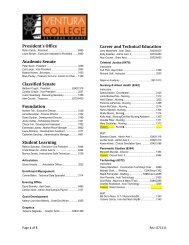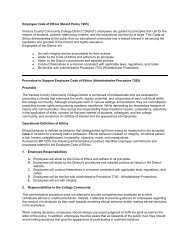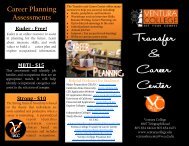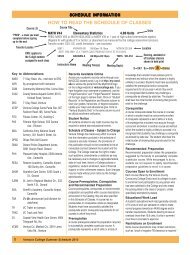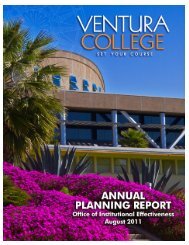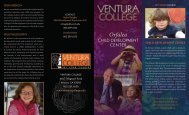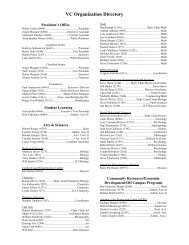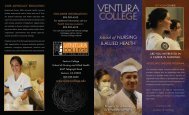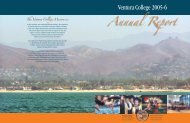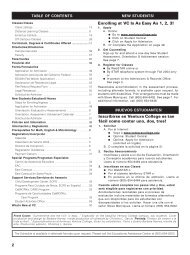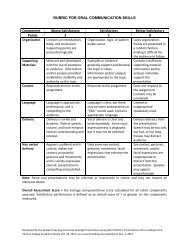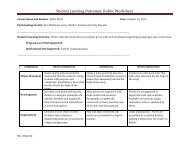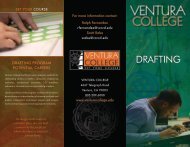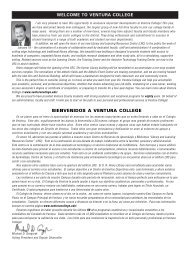2011 General CataloG & announCement of Courses - Ventura College
2011 General CataloG & announCement of Courses - Ventura College
2011 General CataloG & announCement of Courses - Ventura College
Create successful ePaper yourself
Turn your PDF publications into a flip-book with our unique Google optimized e-Paper software.
1. A student to whom access is granted pursuant to Education<br />
Code §76230.<br />
2. Parties to whom directory information is released pursuant<br />
to §76240.<br />
3. Parties for whom written consent is executed by the student<br />
pursuant to §76242.<br />
4. Officials or employees having a legitimate educational<br />
interest pursuant to §76243(a).<br />
Such record shall be open to inspection only by the student<br />
and the college <strong>of</strong>ficial or his or her designee responsible for the<br />
maintenance <strong>of</strong> students records, and to the Comptroller <strong>General</strong><br />
<strong>of</strong> the United States, the Secretary <strong>of</strong> Education, an administrative<br />
head <strong>of</strong> an education agency as defined in Public Law 93-380, and<br />
state educational authorities as a means <strong>of</strong> auditing the operation<br />
<strong>of</strong> the system.<br />
(4) The right to file a complaint with the U.S. Department <strong>of</strong><br />
Education concerning alleged failures by the <strong>College</strong> to<br />
comply with the requirements <strong>of</strong> FERPA. The name and<br />
address <strong>of</strong> the Office that administers FERPA are:<br />
Family Policy Compliance Office<br />
U.S. Department <strong>of</strong> Education<br />
400 Maryland Avenue, SW<br />
Washington, DC 20202-5920<br />
Students, for a fee determined by the Board, may request copies<br />
<strong>of</strong> their records.<br />
APPENDIX IV<br />
Academic Freedom<br />
The primary purpose <strong>of</strong> a college is to promote the exploration<br />
<strong>of</strong> ideas and the discovery and dissemination <strong>of</strong> knowledge and<br />
understanding. The <strong>College</strong> is to be an open forum for ideas and<br />
issues to be raised, challenged, and tested.<br />
Academic freedom is the cornerstone <strong>of</strong> a college. Intellectual<br />
ferment is absolutely dependent upon academic and intellectual<br />
freedom. Freedom in teaching is fundamental for the protection<br />
<strong>of</strong> both faculty and students in teaching and learning. Freedom in<br />
research is fundamental to the advancement <strong>of</strong> knowledge.<br />
The 1940 American Association <strong>of</strong> University Pr<strong>of</strong>essors<br />
(A.A.U.P.) Statement <strong>of</strong> Principles on Academic Freedom and<br />
Tenure with 1970 Interpretative notes from the A.A.U.P. provide a<br />
nationally recognized definition <strong>of</strong> academic freedom, its protections<br />
and its responsibilities.<br />
(a) Academic employees are entitled to freedom in the classroom<br />
in discussing their subject, but they should be conscientious<br />
regarding teaching subject matter which has no relation to their<br />
subject.<br />
(b) Academic employees are entitled to full freedom in research and<br />
in the publication <strong>of</strong> results, subject to the adequate performance <strong>of</strong><br />
their other academic duties, but research for pecuniary return should<br />
be based upon an understanding with the authorities <strong>of</strong> the institution.<br />
(c) Academic employees are citizens, members <strong>of</strong> a learned<br />
pr<strong>of</strong>ession, and <strong>of</strong>ficers <strong>of</strong> an educational institution. When they<br />
speak or write as citizens, they should be free from institutional<br />
censorship or discipline, but their special position in the community<br />
imposes special obligations. As scholars and educational <strong>of</strong>ficers,<br />
they should remember that the public may judge their pr<strong>of</strong>ession<br />
and institution by their utterances. Hence, they should at all times<br />
be accurate, should show respect for the opinions <strong>of</strong> others, and<br />
indicate that they are not speaking for the institution.<br />
It is the policy <strong>of</strong> <strong>Ventura</strong> County Community <strong>College</strong> District<br />
(VCCCD) that all academic employees, regardless <strong>of</strong> their<br />
employment status, should enjoy the privileges and exercise the<br />
responsibilities inherent in academic freedom as defined by the<br />
AAUP statement. In addition, all VCCCD employees enjoy the same<br />
protection and responsibilities within the context <strong>of</strong> their obligations.<br />
Furthermore, faculty tenure constitutes the strongest procedural<br />
safeguard <strong>of</strong> academic freedom and individual responsibility, and<br />
as such, is essential for the maintenance <strong>of</strong> intellectual liberty and<br />
high standards in teaching and scholarship.<br />
Reference: BP 4030 Academic Freedom, Title 5, §51023; Accreditation<br />
Standard 11.A.7.<br />
APPENDIX V<br />
Solicitation<br />
The solicitation, selling, exposing for sale, <strong>of</strong>fering to sell, or<br />
endorsing <strong>of</strong> any goods, articles, wares, services or merchandise <strong>of</strong><br />
any nature whatsoever for the purpose <strong>of</strong> influencing lease, rental<br />
or sale at a college is prohibited except by written permission <strong>of</strong><br />
the District Chancellor, President <strong>of</strong> the <strong>College</strong> or the President’s<br />
designee. This policy applies to all students, staff, and all others.<br />
Nothing in this policy shall be construed to revoke the rights<br />
and privileges <strong>of</strong> students and staff as specifically granted by<br />
education code sections and board policy with regard to fundraising<br />
activities, examinations <strong>of</strong> instructional materials, or other<br />
activities sanctioned by federal, state, and local regulations.<br />
APPENDIX VI<br />
Publicity Code and Information Dissemination<br />
Students wishing to post, display, distribute, or otherwise make<br />
known an activity, event or other piece <strong>of</strong> information should seek<br />
advance approval from the Student Activities Office. This policy<br />
applies to all printed material distributed by students and all<br />
others on the <strong>Ventura</strong> <strong>College</strong> campus including, but not limited,<br />
to all petitions, circulars, leaflets, newspapers, and all materials<br />
displayed on bulletin boards, kiosks, signboards, or other such<br />
display areas. In no case should printed materials be placed on<br />
lamp poles, buildings, windows, doors, retaining walls, painted<br />
surfaces, sidewalks, plants, and other such places.<br />
All printed materials should be clearly designed to meet the<br />
needs <strong>of</strong> students, staff, and faculty; and the event, activity or<br />
program should be <strong>of</strong> obvious benefit to members <strong>of</strong> the campus<br />
community. All posted materials must display the <strong>Ventura</strong> <strong>College</strong><br />
approval stamp. Persons posting materials will be responsible<br />
for their prompt removal when the activity or event is concluded.<br />
Failure to remove the posted material may result in a withdrawal<br />
<strong>of</strong> future posting privileges.<br />
<strong>Ventura</strong> <strong>College</strong> Catalog 2010 - <strong>2011</strong> Appendices 237



